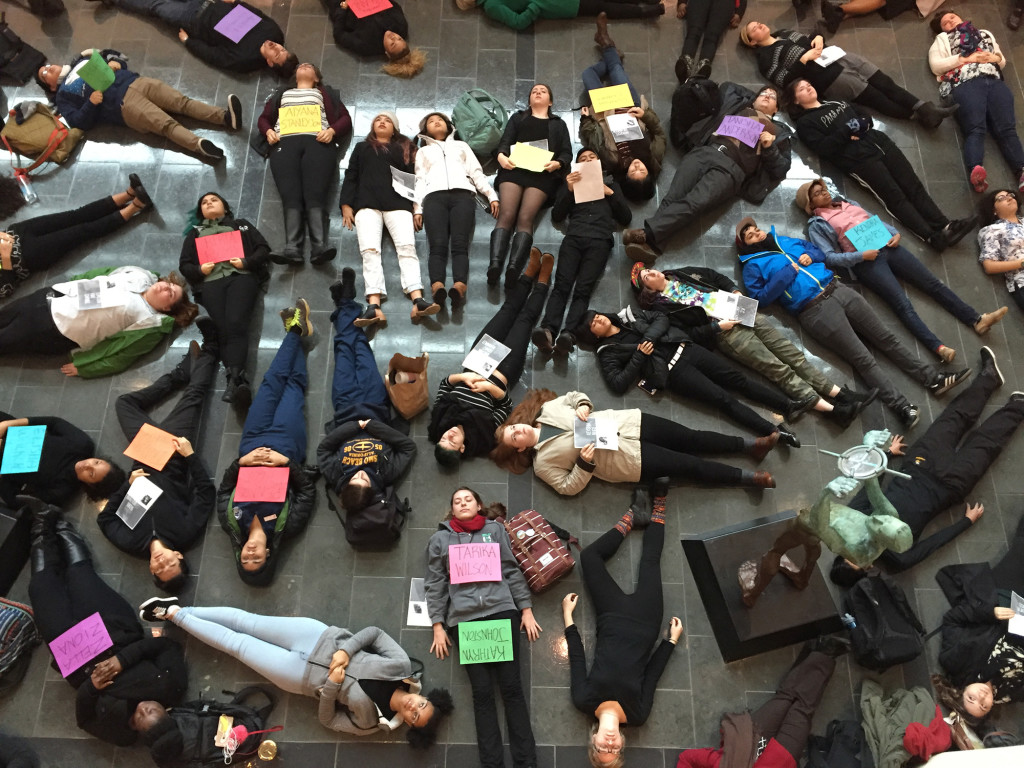Dozens of students, many wearing all black, interrupted the typically quiet energy of the Seattle University School of Law building on Monday.

Students participate in the #SayHerName Die-in as part of Transgender Awareness Week
“We’re here to say what?” shouted Tyrone Brown, staff member in the Division of Student Development.
“Say her name!” they said.
Their voices reverberated off the walls, demanding to be heard.
A crowd gathered around them and peered from the floors above as the group shouted the names of black transgender women killed in the U.S. this year, each name said three times. There were 21 names total.
The #SayHerName Die-in, a form of protest where participants lie down to simulate death, was an event organized by Moral Mondays at Seattle U as a part of Transgender Awareness Week, which occurs this year on Nov. 16–20. Brown wanted this week’s Moral Mondays event to focus on black transgender women specifically, as the majority of trans fatal violence victims are black transgender women and women of color. As the die-in ended, a woman came up to Brown and embraced him.
“She was crying,” Brown said. “She [said] thank you—I think she was thanking all of us.”
Senior visual arts major, Maya Lall, participated in the Die-in.
“With LGBTQ, the T is often forgotten,” said Lall, who uses they/them pronouns.
Lall said that even though gender non-conforming and trans people are part of our community, many people don’t realize the discrimination and violence they experience every day.
The U.S. had more transgender homicide victims in 2015 than in any other year, nearly all of them transgender women of color. The intersections of racism, sexism, and transphobia are part of the reason why black transgender women especially are victims of this epidemic of violence.
Die-ins have occurred in the Student Center in the past, but Brown wanted to make the location of this particular die-in at the school of law.
“With the Black Lives Matter movement, it’s also about thinking a little bit outside the box around what protest could be,” Brown said.
Law school students are on a semester system—meaning there is sometimes a disconnect between law students and the rest of the Seattle U community. Brown wanted to bridge that gap, especially since those in the law school will have a direct impact on trans lives.
“A lot of the issue we’re talking about…are dealing around the issues of the justice and legal system,” Brown said. “Those students, faculty and staff already have a direct impact on that or will.”
Students can participate in Transgender Awareness Week this Friday by attending the Trans Day of Remembrance (TDOR).
Lall is one of the core founding members of Campus Ministry’s Gender and Sexuality Programming (GASP) and initiated TDOR last year.
“One of my friends was a transgendered woman and ended up taking away her life,” Lall said. “I thought that trans day of remembrance is a really important [day] and it became very close to my heart.
Last year, those in attendance recognized trans individuals who have passed by floating candles in the reflection pool after stating each person’s name. This year, organizers of the event want to focus more on the lives of those lost by replacing those candles with flowers and ringing the Bell Tower once for each transgendered life lost worldwide this year—271 lives total.
“We wanted to recognize this year that they were living breathing humans who laughed, cried and had all sorts of emotions…we want to honor their lives and embrace that,” Lall said.
Sophomore humanities for leadership and psychology double major Zeena Rivera joined the planning committee of GASP last year. She said systemic violence against transgender people is a paramount social justice issue, which is why it is important for everyone to be aware of these issues, especially if they attend Seattle U.
In 2011, the committee to improve trans inclusion released a report that detailed the challenges around trans awareness and access and strategies for improvement. Some of the challenges include locker room and bathroom accessibility, lack of training, marginalization, pay compensation and equity issues and that trans people are overburdened with the task of leading change at Seattle U.
One of the ways to make change is to stop assuming people’s genders and start creating an environment where people feel open to explore and embrace their identity.
Lall suggests that one way to do this is by offering more workshops to professors so they can learn how to be more inclusive in the classroom and start each class by introducing pronouns.
“These are our sisters and brothers, these are our classmates, these are our friends, these are our peers,” Rivera said. “We all have a part to play in making sure that we won’t have to have TDOR in the future.”
TDOR will take place on Nov. 20 at noon. All week long tables in front of the Office of Multicultural Affairs, Campus Ministry, and the Pigott building have different resources for trans people on campus.
Melissa may be reached at editor@su-spectator.com








